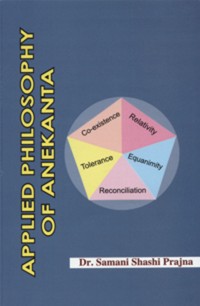Family is an important unit of social setup. Mahāprajña says all the activities in life and society are built on the bricks of opposing principles. If these opposing bricks were not there, there would be no activity, no civilization.[1] There are opposing desires, opposing aspirations and opposing conduct.The utility of anekānta lies in creating a peaceful atmosphere amongst the family members. Usually there are two centers of family disputes between a father and a son and between a mother in law and daughter in law. Familial disputes centre around the father who wants to mold his son’s life in the value system in which he has been brought up, because he thinks that he has experience, whereas his son has logic on his side. Similar is the condition between mother in law and daughter in law. She also wants to live a life, as free and independent as she had lived in her parental home, against which her in- laws’ members expects certain restraints on her part. All these leads to conflict and unless there is a feeling of tolerance and understanding on both the sides, the problem can't be resolved. As per the view of Ācārya Mahāprajña, "Tolerating each other instead of prevailing differences is the first step for peaceful co-existence."[2] If a group of people can be trained to live together peacefully, one can say that they have learnt the first lesson of non-violence. For this, one has to develop a spiritual consciousness that "I am a sole entity and he is not mine”. So every man is at the same time separate from his fellows and related to them. Such separateness and relatedness are mutually necessary postulates. Personal relations can exist only between being who are separate but who are not isolated.[3] This spiritual perspective will establish healthy and peaceful relationships between the family members, whereas a man of selfish consciousness desires to lead a happy life, which is confined to him. This selfish attitude engenders the seeds of greed, possession or accumulation and gives rise to many problems within a family. So according to Acārya Mahāprajña, the development of spiritual consciousness is the stepping-stone for peaceful co-existence of a family.[4] The problem today is that, no attempt is made to awaken spiritual consciousness neither in children nor in elders. People don't even know how to subside these emotions. In order to achieve the goal of peaceful co-existence, one should teach the children to breathe properly and make them practice long breathing from the very beginning. Automatically, the doors of our destination i.e. ‘peaceful co-existence’ will be opened.
Footnotes
Mahāprajña, Ācārya. Anekaāta: The Third Eye. Trans. Sudhamahi Regunathan. Ladnun: Jain Vishva Bharati Institute.2002,p.10.
Mahāprajña.Happy and Harmonious Family, Trans. Sadhvi Vishrut Vibha. Ladnun: Jain Vishva Bharati. 1st edn. 2008.p. 16.
R.D. Laing, The Divided Self, Preface to the Prelican. Edition, 1965, p.11.
 Dr. Samani Shashi Pragya
Dr. Samani Shashi Pragya

